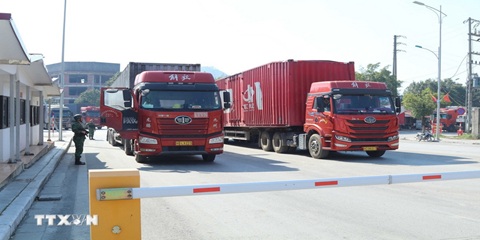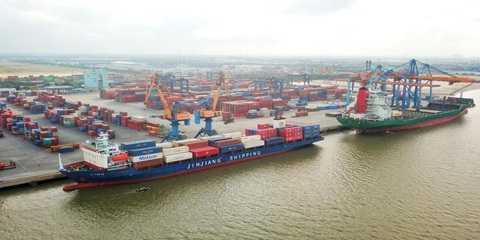Want to be in the loop?
subscribe to
our notification
Business News
STATE BUDGET REVENUE PROJECTED TO SURPASS 10% TARGET
The 2024 State budget revenue aims to exceed estimates by 10%. This directive is outlined in Prime Minister Pham Minh Chinh's Official Dispatch 85/CD-TTg, dated September 2, 2024, which was sent to ministers, heads of ministerial-level agencies, government agencies, and chairpersons of provincial and municipal people's committees.
Effort to execute solutions and tasks
The official dispatch clearly stated that State budget revenue in the first eight months of 2024 was estimated to reach 78.5% of the target while policies on exemption, reduction and extension of many taxes, fees, charges, land rents and other budgetary items were already executed. State budget expenditures were managed with strict adherence to economy and efficiency. The state budget balance was maintained, and the state budget deficit, public debt, government debt, and foreign debt remained within the limits set by the National Assembly.
However, business operations of companies are still in difficulty, under high inflationary pressure, and affected by complicated natural disasters and floods. Overall, the State budget revenue increased from a year earlier, but some revenue items were still behind the expected collection progress, especially land use fees. The progress of investment disbursement for development investment in the first eight months of the year only reached 40.49% of the plan assigned by the Prime Minister, lower than the year-ago period. 19 ministries, central agencies and 31 provinces/cities localities have not yet allocated the capital as planned for 2024.
In addition, with the oversight of the National Assembly, the conclusion of the State Inspectorate and Audit and the annual State budget settlement result, the adherence to financial discipline and order in some places is not strict. Law violations, fraud, tax evasion, breached management and use of State budget and public assets, loss and waste occur in some ministries, agencies and localities.
In the coming months, both global and domestic conditions are forecast to experience complex and unpredictable changes, which may adversely impact the Vietnamese economy. The Prime Minister asked ministers, and provincial/municipal leaders to focus on directing their subordinates to effectively implement socioeconomic development and budget goals, boost revenues, control spending, and balance the State budget for the rest of 2024.
Resolute to boost State budget collection in the remaining months
The Prime Minister urged ministries, agencies, and localities to continue effectively implementing key solutions to boost State budget collection in the remaining months of the year. The goal is to achieve approximately 7% GDP growth in 2024, exceeding the target. Efforts should focus on achieving the highest assigned revenue target, improving institutions and policies on State budget collection, ensuring accurate and timely revenue collection, and preventing revenue loss. Additionally, the Prime Minister emphasized the need to refine tax regulations on property, expand the tax base, and explore new revenue sources with growth potential.
The Prime Minister urged the further promotion of effective digital transformation and the application of information technology to enhance revenue management, particularly from e-commerce transactions and foreign suppliers. This includes launching a data portal for e-commerce platforms and expanding the use of electronic invoices generated from cash registers for enterprises and business households, especially those providing goods and services directly to consumers, such as in the food services sector. On that basis, ministries, agencies and localities will strive to collect the State budget revenue 10% more than the estimation assigned by the National Assembly in 2024 and achieve a 5% year on year growth in State budget revenue in 2025 to ensure resources for expenditure tasks, increase expenditure to create sources for salary reform and handle unexpected tasks.
The Prime Minister urged the active management of State budget expenditures, emphasizing reductions and improved efficiency. This includes cutting 5% from assigned regular expenditures and thoroughly reviewing and re-arranging spending tasks to save costs. For 2025, ministries, agencies, and localities are required to reduce regular expenditures by an additional 10% compared to 2024, beyond the 10% reduction for mandatory salary reforms. This will help reserve resources to narrow the State budget deficit, address urgent tasks, support social security, or supplement development investments, while excluding similar expenditures as per Resolution 119/NQ-CP dated August 7, 2024.
The Prime Minister tasked the Ministry of Finance with collaborating with ministries, agencies, and localities to implement a careful and effective expansionary fiscal policy. This policy should be well-coordinated with monetary policy to foster growth, stabilize the macroeconomy, control inflation, and maintain major economic balances, while keeping the State budget deficit and public debt within acceptable limits.
The General Department of Taxation should accelerate digital transformation and electronic invoicing, enhance management of budget revenues and expenditures, ensure accurate and timely tax collection, expand the revenue base, and prevent tax losses, particularly from e-commerce. The customs sector must intensify efforts to combat trade fraud, transfer pricing, import price fraud, and smuggling.
Source: VCCI
Related News

VIETNAM’S SEAFOOD EXPORTS HIT OVER US$10 BILLION IN JAN-NOV
Seafood export revenue in November alone amounted to nearly US$990 million, up 6.6% year-on-year. Key product groups posted solid gains. Shrimp exports rose 11.7% to over US$385 million, supported by strong demand for whiteleg shrimp and lobster. Tra fish shipments increased 9.7% to almost US$197 million, while marine fish, squid, and mollusk exports maintained their recovery.

VIETNAM’S AGRO-FORESTRY-FISHERY EXPORTS HIT NEW RECORD IN JAN-NOV
Vietnam’s agro-forestry-fishery export revenue reached an estimated US$64.01 billion in the first 11 months of 2025, up 12.6% year-on-year and surpassing the full-year record of US$62.4 billion set in 2024. Agricultural exports reached US$34.24 billion, up 15% year-on-year, while livestock products brought in US$567.4 million, a 16.8% increase. Seafood exports rose 13.2% to US$10.38 billion, and forestry products earned US$16.61 billion, up 5.9%.

HANOI REPORTS RECORD-HIGH BUDGET REVENUE IN 2025
Hanoi’s budget revenue is estimated to reach VND641.7 trillion in 2025, the highest level ever recorded and nearly 25% above the revised target, according to a report by the municipal government. Data from the city’s socioeconomic performance review shows that total state budget collections in 2025 are projected to reach 124.9% of the adjusted plan and rise 24.9% from 2024, the Vietnam News Agency reported.

VIETNAM, CHINA TO PILOT TWO-WAY CARGO TRANSPORT AT LANG SON BORDER
Vietnam and China will launch a one-year pilot program on December 10 to allow two-way cargo transport through the Huu Nghi–Youyi Guan international border gates in Lang Son Province, reported the Vietnam News Agency. The Dong Dang-Lang Son Economic Zone Management Board said the trial aims to reduce transport costs and improve customs clearance capacity.

VIETNAM’S IMPORT-EXPORT VALUE NEARS US$840 BILLION IN JAN-NOV
The total value of Vietnam’s imports and exports was nearly US$840 billion between January and November this year, the highest level ever recorded, according to the National Statistics Office. In its latest report on the country’s socio-economic performance, the National Statistics Office highlighted a series of positive economic indicators, with trade emerging as one of the strongest drivers of growth.

OVER 19 MILLION INTERNATIONAL VISITORS COME TO VIETNAM IN JAN-NOV
Vietnam received more than 19.1 million international visitors in the first 11 months of 2025, a 20.9% increase year-on-year and the highest level ever recorded, according to the National Statistics Office. The figure surpasses the full-year record of 18 million arrivals set in 2019, before the Covid-19 pandemic. Nearly two million foreign visitors arrived in November alone, up 14.2% from October and 15.6% from the same period last year.
























